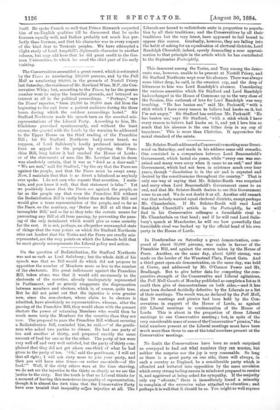On the question of Redistribution, Sir Stafford Northcote was not
so rash as Lord Salisbury ; but the whole drift of his speech was that no Bill would do which did not propose to apportion the number of Members more or less to the number of the electorate. His great indictment against the Franchise Bill, taken alone, was that it would add enormously to the electorate of the counties, already inadequately represented in Parliament, and so grossly exaggerate the disproportion between members and electors, which is, of course, quite true. But he did not point out that the injustice is even greater now, since the non-electors, whose claim to be electors is admitted, have absolutely no representatives, whereas, after the passing of the Franchise Bill, they would share with the present electors the power of returning Members who would then be much more truly the Members for the counties than they are now. The proposal to pass the Franchise Bill without securing a Redistribution Bill, reminded him, he said,—" of the gentle- man who asked two parties to dinner. He had one party of ten and another of thirty, and prepared exactly the same amount of food for one as for the other. The party of ten were very well off and very well satisfied, but the party of thirty corn- • plained that they did not get above one-third of what he had given to the party of ten. Oh,' said the gentleman, ' I will set that all right; I will ask sixty more to join your party, and then you will have nine times—or rather one-ninth—of the food. " Well, if the sixty others were at the time starving, we do not see the injustice to the thirty so clearly as we see the justice to the sixty. But the truth is that no Liberal thinks for a moment of leaving this monstrous inequality of representation, though it is almost the first time that the Conservative Party have ever treated that inequality asSan injustice at all. The Liberals are bound to redistribute seats in proportion to popula- tion by all their traditions; and the Conservatives by all their- traditions but the very latest, have appeared to feel bound to oppose this course. Gradually, however, they are falling into the habit of asking for an equalisation of electoral districts, Lord Randolph Churchill, indeed, openly demanding a near approxi- mation to that principle in the article which he has contributed to the September Fortnightly.


































 Previous page
Previous page